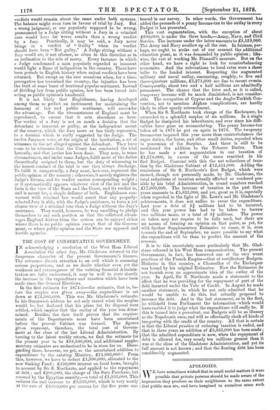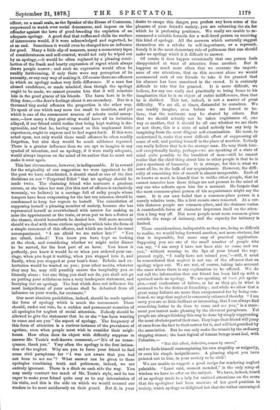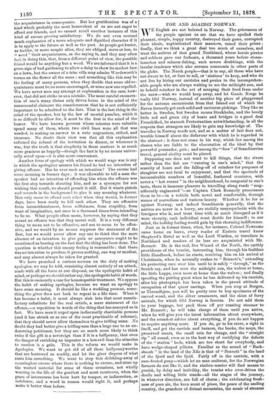APOLOGIES.
WE have sometimes wished that in small social matters it were possible that private persons should be made aware of the impression they produce on their neighbours to the same extent that public men are, and have imagined to ourselves some such officer, on a small scale, as the Speaker of the House of Commons, empowered to watch over social demeanour, and impose on the offender against the laws of good-breeding the expiation of an adequate apology. A good deal that ruffles and chills the surface of intercourse would, if it were acknowledged and regretted, be at an end. Sometimes it would even be changed into an influence for good. Many a little slip of manners, many a momentary lapse of considerateness and self-control, would not only be wiped out by an apology,—it would be often replaced by a pleasing recol- lection of the frank and hearty expression of regret which always draws people nearer ; and such an expression would often be readily forthcoming, if only there were any perception of its necessity, or any easy way of making it. Of course there are offences in which an apology makes very little difference. If a man has abused confidence, or made mischief, then though the apology ought to be made, we cannot promise him that it will reinstate him in the good graces of his friends. The harm here is in the thing done,—the doer's feelings about it are secondary. But in a thousand tiny social offences the proportion is the other way. To speak of one which may seem too small to mention, and yet which is one of the commonest sources of minute social annoy- ance,—how many a tiny gnat-sting would have all its irritation allayed, if our friend could realise that being kept waiting is dis- agreeable, and that he, having caused us this unpleasant little experience, ought to express and to feel regret for it. If this were acted upon, not only would these small offences be often readily forgotten, but also they would be much seldomer repeated. There is a greater influence than we are apt to imagine in any symbol of intention, and an apology, if it were really adequate, would always impress on the mind of its author that he must not make it over again.
This last circumstance, however, is indispensable. If in reward for the originality of our suggestion we were appointed to fill the post we have adumbrated, it should stand as one of the first decisions on our " Perpetual Edict" that no apology should be made twice. The charming friend who murmurs a gracious excuse, as she takes her seat (for this sort of offence is exclusively womanly, we believe) in a carriage full of sulky people whose tempers have been evaporating for the last ten minutes, should be condemned to keep her regrets to herself. The consolation of supposing herself a pleasing member of society, because she has represented herself as overwhelmed with sorrow for making us miss the appointment or the train, or even put us into a flutter at the chance, should henceforth be denied her. Still more severely should we deal with those curious apologies which take the form of a simple statement of this offence, and which are indeed its usual accompaniment. " I am afraid we are rather late ?" " You are afraid, indeed ! You know you have kept us looking at the clock, and considering whether we might order dinner to be served, for the best part of an hour. You know it perfectly, you knew it would be so when you ordered your car- riage, when you kept it waiting, when you stepped into it, and finally, when you stopped at your host's door. Rebuke and ex- hortation would be wasted on you ; your other merits, whatever they may be, may still possibly ensure the hospitality you so liberally abuse ; but one thing you shall not do, you shall not go on putting your selfishness into a very inadequate statement, and fancying that an apology. The fear which does not influence the most insignificant of your actions shall be debarred from all influence on your words, for evermore."
Our most absolute prohibition, indeed, should be made against the form of apology which is much the commonest. There should, under our rule, be a sudden and permanent cessation of all apologies for neglect of social attention. Nobody should be allowed to give the statement that he or she "has been wanting to come and see you " the aspect of apology. The frequency of this form of attention is a curious instance of the prevalence of egotism, even when people most wish to consider their neigh- bours. How often does its object with difficulty suppress in answer Mr. Toots's well-known comment,—" It's of no conse- quence, thank you." Very often the apology is the first intima- tion of the neglect. Why are you to force your friend to find some civil paraphrase for " I was not aware that you had not been to see me "? What answer can be given to these apologies combining truth and politeness, indeed, we are entirely ignorant. There is a ditch on each side the way. You may easily contract too much of Mr. Toots's style, and be too eager to make your friend quite easy as to any intermission of his visits, and this is the side on which we would counsel our readers to be most assiduously on their guard. But if, in your desire to escape this danger, you profess any keen sense of the pleasure of your friend's society, you are enhancing the sin for which he is professing penitence. We really are unable to re- commend a suitable formula for a well-bred person on receiving this kind of apology. All the answers which naturally suggest themselves are a rebuke to self-importance, or a reproach. Surely it is the most elementary rule of politeness that one should make no apology which it is difficult to answer.
Of course it does happen occasionally that one person feels disappointed at want of attention from another. But it happens so much more often that we overrate the import- ance of our attentions, that on this account alone we would recommend each of our friends to take it for granted that his absence has been unnoticed in the crowd. It is curiously difficult to take this for granted. It is more difficult, we believe, for any one really and practically to bring home to his imagination that he is an object of entire indifference, than that he is disliked. This last, indeed, is not a matter of great difficulty. We are all, at times, distasteful to ourselves. We can readily imagine, even before we are forced to be- lieve, that the sentiment may be shared by others. But that we should actually not be taken cognisance of, one way or another, that it should be all one whether we are there or not there, this is a state of mind nobody has any help in imagining from the moat diligent self-examination. He must, to understand it, make that most difficult effort of suppressing all sense of self, and putting himself in the place of another. Nobody can really believe that he is the average man. He may think him- self exceptionally faulty, perhaps—we are speaking of a state of mind quite possible to the humblest of men—still he cannot realise that the chief thing about him to other people is that he is just a specimen of humanity. It is strange, for this is what we must all be, to the bulk of our acquaintance. However, the diffi- culty of conceiving this of oneself is almost insuperable. Each of us knows so much in himself that is unlike other people, that he cannot conceive how these things are not present to the mind of any one who reflects upon him for a moment. He forgets that the most common-place person of his acquaintance might say the same. It is our own belief that a common-place person is a merely relative term, like a first cousin once removed. At a cer- tain distance people are common-place, and the distance varies. A considerable force of character impresses itself on the atten- tion a long way off. But most people must seem common-place outside the range of intimacy, and the capacity for intimacy is limited.
These considerations, indisputable as they are, being so difficult to realise, we would bring forward another, not more obvious, for that is impossible, but more easy of practical application. Supposing you are one of the small number of people who can say, "I am sorry I have not been able to come and see you," without rousing to the lips of your friend the sup- pressed reply, "I really have not missed you,"—still, it must be remembered that neglect is not one of the offences that an apology wipes out. We are not, of course, taking into account the cases where there is any explanation to be offered. We do not call the information that our friend has been laid up with a sprained ancle an apology. We are speaking of bond fide apolo- gies,—real confessions of failure, as far as they go, in what is assumed to be the duties of friendship ; and while we allow that a great many failures are more than compensated for by being con- fessed, we urge that neglect is commonly enhanced thereby. " I am sorry you are so little brilliant or interesting, that I can always find something better to do than to come and see you," is a state- ment you cannot make pleasing by the cleverest paraphrase. Yet people are always thinking this may be done by simply suppressing the most obvious part of their case. They hope their friend will jump at once from the fact to their sorrow for it, and will feel gratified by the association. But he can only make the transit by the ordinary stepping stones ; the least logical of human beings must feel, with Polonius,— "But this effect, defective, comes by cause," and so finds himself contemplating his own stupidity or vulgarity, or even his simple insignificance. A pleasing object you have pointed out to him, in your anxiety to be civil !
We are unable to suggest a good recipe for rendering neglect palatable. "Least said, soonest mended," is the only scrap of wisdom we have to offer on the subject. We have, indeed, heard of an apology made to a lady for omitted attentions on the score that the apologiser had been unaware of her good position in society, which apology so delighted her that she rather encouraged
the acquaintance in consequence. But her gratification was of a kind which probably the most benevolent of us are not eager to afford our friends, and we cannot recall another instance of this kind of excuse proving satisfactory. We do not even counsel much explanation of a more adequate and dignified character if it is to apply to the future as well as the past. As people get busier, or feebler, or more sought after, they are obliged, more or less, to " weed " their acquaintance, as the saying is, and they may often feel, in doing this, that, from a different point of view, the possible friend would be anything but a weed. We are informed that it is a gross sign of bad gardening to allow a daisy to show its modest face on a lawn, but the owner of a trim villa may admire Wordsworth's verses on the flower all the same ; and something like this may be the feeling of many persons, when they decide that some old ac- quaintance must be no more encouraged, or some new one repelled. We have never seen any attempt at explanation in the case, how- ever, that did not strike us as a mistake. The most careful enumera- tion of one's many claims only drives home to the mind of the unsuccessful claimant the consciousness that he is not sufficiently important to be admitted to the lists. That is the last thing in the mind of the speaker, but by the law of mental parallax, which it is so difficult to allow for, it must be the first in the mind of the hearer. We have known persons whose minutes were valuable spend many of them, where two civil lines were all that was needed, in making an answer to a note ungracious, stilted, and tiresome. No doubt their view was that all this explanation softened the refusal of the invitation to dinner, or whatever it was, but the truth is that simplicity in these matters is as much more gracious as happily—though the fact is by no means univer- sally acted upon—it is also more convenient.
Another form of apology with which we would wage war is any in which the apologiser assures his friend he had no intention of giving offence. Has he ever such an intention? The excuse had some meaning in former days ; it was allowable to tell a man the speaker had no intention of offending him when the offence was the first step towards shooting him, and as a synonym for not wishing that result, we should permit it still. But it wants pistols and seconds in the background to give it any meaning whatever. Men only mean to offend each other when they would, in former days, have been ready to kill each other. They are offensive from inconsiderateness, from selfishness, from stupidity, from want of imagination, not once in a thousand times from intending to be so. What people often mean, however, by saying that they meant no offence was that they meant well. It is a very different thing to mean not to be offensive, and not to mean to be offen- sive, and we would by no means suppress the statement of the first, but we would never allow any one to think that the mere absence of an intention to give pain or annoyance ought to be mentioned as bearing on the fact that the thing has been done. The question is whether this uneasy feeling is reasonable ; that there was no intention to produce it proves nothing, one way or another, and may almost always be taken for granted.
We have preached a curious sermon on the duty of making apologies, we may be told, consisting almost entirely of an attack, made with all the force at our disposal, on the apologetic habit of mind, or perhaps we should rather say, the apologetic habit of words. But this is eminently a case for homoeopathic treatment. We oppose the habit of making apologies, because we want an apology to have some meaning. It should be like a wedding present, some- thing the giver does not look to repeat in a life-time. When it has become a habit, it must always sink into that most unsatis- factory substitute for the real article, a mere statement of the offence,—a repetition in words of the thing that has annoyed us in fact. We have seen it urged upon indiscreetly charitable persons (and it has struck us as one of the most practicable of reforms), that they should never allow themselves to give trifling sums. No doubt they had better give a trifling sum than a large one to an un- deserving petitioner, but they are so much more likely to think twice if the gift is a sovereign than if it is a halfpenny, that even the danger of enriching an impostor is a less evil than the stimulus to caution is a gain. This is the reform we would make in Apologies. We want to get rid of all these halfpennyworths that are bestowed so readily, and let the giver dispose of what costs him something. We want to stop this dribbling-away of meaningless excuse where there is nothing to excuse, and store up the wasted material for some of those occasions, not wholly wanting to the life of the gentlest and most courteous, when the grace of intercourse has been hurt by temper, or indiscretion, or indolence, and a word in season would right it, and perhaps make it better than before.
































 Previous page
Previous page